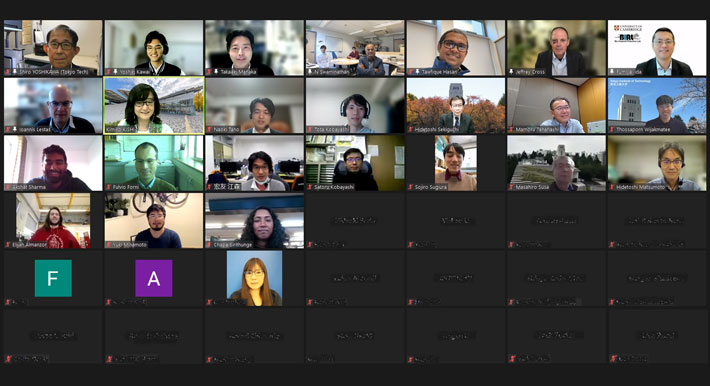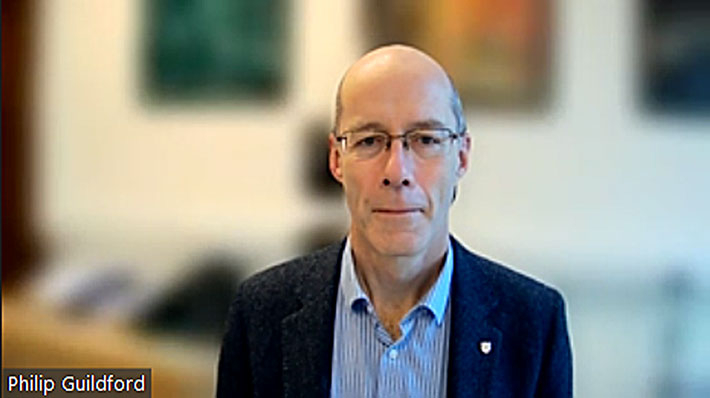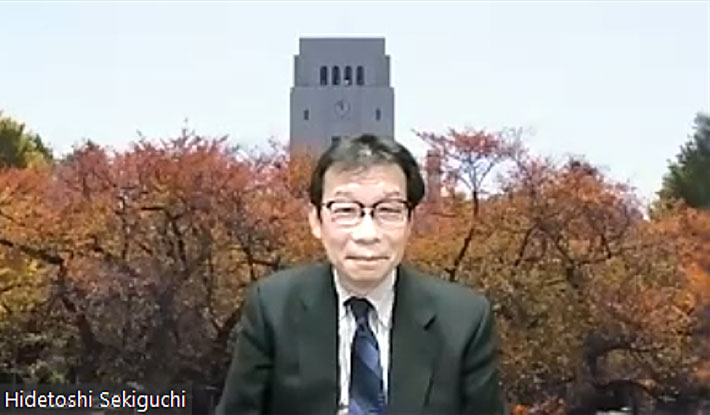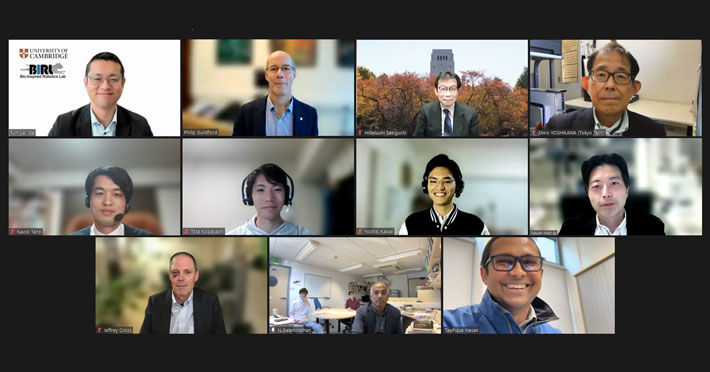Tokyo Institute of Technology (Tokyo Tech) and the University of Cambridge jointly held a "WORKSHOP ON SUMMER EXCHANGE RESEARCH PROGRAM (SERP)" on November 25. There were more than 100 registrations by faculty and students from both universities, showing the strength of interest towards SERP.
This workshop consisted of two parts: first presentations by Tokyo Tech students who conducted research projects at the University of Cambridge this year, second a panel discussion by faculty members from both universities to exchange opinions and provide advice to the participants.

Photo of the participants
Opening remarks were given by Mr. Philip Guildford, Chief Operating Officer of the University of Cambridge's Department of Engineering, who stated the importance of SERP between Tokyo Tech and the University of Cambridge. He noted both institutions established their Engineering programs over 140 years ago. Prof. Sekiguchi, Dean of School of Materials and Chemical Technology, explained the importance of the ongoing relationship with the University of Cambridge since the establishment of SERP in 2005 and the potential for the future.
SERP is an exchange program for graduate students specializing in research to study abroad in order to broaden their knowledge and perspectives by conducting research in different countries and learn about the local culture. This program was established in 2005 by faculty members of the Schools of Engineering, Materials and Chemical Technology, and Environment and Society. Today, as a super global institution, one of Tokyo Tech's objective is to develop technical leaders for a global society by improving student's intercultural communication skills through the understanding of diversity, and this program suits this aim strongly. The University of Cambridge was one of the initial partner institutions to conclude a SERP agreement.
Mr. Philip Guildford graduated from the University of Cambridge in 1985. He is currently the Chief Operating Officer of University of Cambridge's Department of Engineering, where he leads a professional team which support the academic community in areas such as finance, corporate partnerships, IP transfer, and entrepreneurship.

Mr. Guildford
Professor Hidetoshi Sekiguchi, Dean of School of Materials and Chemical Technology, received his doctoral degree from Tokyo Tech in 1990. He has been involved in many international collaboration operations and recently served as the Vice President for International Affairs and the Vice Dean for Education and International Affairs. In addition to his current position as Dean, he also leads the international collaboration affairs of three engineering schools.

Prof. Sekiguchi
This workshop consisted of Part 1 and 2, Professor Fumiya Iida from the University of Cambridge was the facilitator.
Part 1: Student Presentations
Presenter: Mr. Naoki Tano, 1st year master's student, School of Engineering
Soft robots have been attracting a lot of interest due to their various applications such as bio-inspired robots and human-cooperative robots. In this program, I worked on the morphology of flexible strain sensors for soft robots' application. There is intensive research being conducted on the sensitivity of flexible strain sensors. However, most of them need specific fabrication equipment or intensive processing, which make the sensors a little bit far from practical applications. Therefore, we worked on applying the cellular structure on a mesoscale to tune the sensitivity. This method is potentially used widely due to its straightforward method.
It was a great asset for me to be able to devote three months to my research with colleagues from different backgrounds who are outstanding in their research. If you have any doubts about studying abroad, I encourage you to take the first step and challenge yourself.
Presenter: Mr. Touta Kobayashi, 1st year master's student, School of Engineering
Fluid flow simulation using machine learning is important and widely used to reduce development costs and improve equipment efficiency. In Prof. Swaminathan's group, I have researched about a data augmentation method suitable for predicting physical phenomena to obtain a wide range of training data. I believe that this will lead to highly accurate simulations that can be adapted under a wide range of conditions.
During this study abroad program, I was able to broaden my international perspective by interacting with fabulous students and conduct research activities under the guidance of my host supervisor. I feel that it has greatly changed the range of my career considerations. I am sure that research experience abroad will be meaningful for anyone, and because it is only for a short period of time (3 months), if you have any doubts, I would like you to participate in this program.
Presenter: Mr. Yoshiki Kawai, 1st year master's student, School of Materials and Chemical Technology
Since I have been working on 1-D nanomaterials in Prof. Matsumoto's laboratory at Tokyo Tech, I decided to study abroad by joining Prof. Hasan's group at the University of Cambridge due to my research interest of 2-D nanomaterials. While I studied in his group, I tried to fabricate ambient-dried 3-D printed graphene oxide aerogels. This research field has huge potential for paving the way for designing many types of new energy devices such as supercapacitors and batteries using aerogels as the electrode materials. Overall, I was pleased to work in a different research field and discuss the results with excellent researchers. This research experience has broadened my knowledge and gave me a global perspective.
Part 2: Panel Discussion
Professor Iida, Professor Tawfique Hasan and Professor Nedunchezhian Swaminathan from Department of Engineering at University of Cambridge, who accepted SERP students from Tokyo Institute of Technology, participated in the panel discussion.
In addition, Professor Takaaki Manaka (School of Engineering), who is Chair of Engineering Schools International Cooperation Committee, Associate Professor Shiro Yoshikawa (School of Materials Science and Engineering), who is Chair of the International Exchange Implementation Committee, and Professor Cross (School of Environmental and Social Science and Engineering), who has been involved in many international collaborations, participated in the panel discussion and exchanged opinions on the significance of this program and the students' research activities.
The Cambridge professors were impressed by the fact that the SERP students from Tokyo Tech were more enthusiastic about their research than most students at Cambridge, and that the student exchange has strengthened the ties between the two universities, having a positive impact on joint research.
Many positive comments were also made about the impact of this program, such as students deciding to change their career paths to academia. During the Q&A session, students from both schools actively asked questions.

Presenters and panelists
It was agreed by both universities that this workshop will be held annually in order to continue the friendly SERP partnership between the two universities, with a view to possibly leading to joint research. In order to promote student's education based upon research, we will continue to implement SERP for graduate students.






